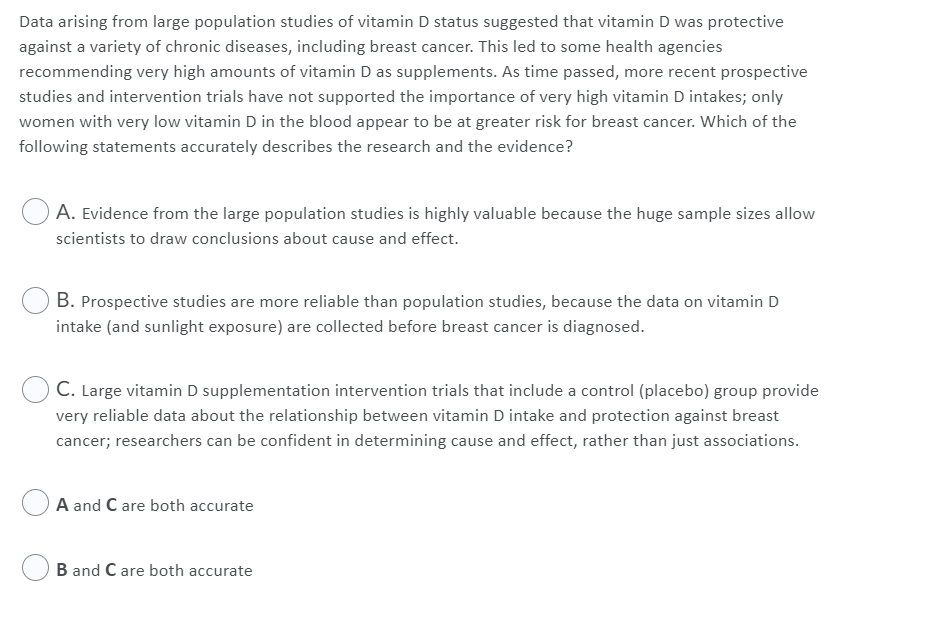Data arising from large population studies of vitamin D status suggested that vitamin D was protective against a variety of chronic diseases, including breast cancer. This led to some health agencies recommending very high amounts of vitamin D as supplements. As time passed, more recent prospective studies and intervention trials have not supported the importance of very high vitamin D intakes; only women with very low vitamin D in the blood appear to be at greater risk for breast cancer. Which of the following statements accurately describes the research and the evidence? A. Evidence from the large population studies is highly valuable because the huge sample sizes allow scientists to draw conclusions about cause and effect. B. Prospective studies are more reliable than population studies, because the data on vitamin D intake (and sunlight exposure) are collected before breast cancer is diagnosed. C. Large vitamin D supplementation intervention trials that include a control (placebo) group provide very reliable data about the relationship between vitamin D intake and protection against breast cancer; researchers can be confident in determining cause and effect, rather than just associations. A and C are both accurate B and C are both accurate
Data arising from large population studies of vitamin D status suggested that vitamin D was protective against a variety of chronic diseases, including breast cancer. This led to some health agencies recommending very high amounts of vitamin D as supplements. As time passed, more recent prospective studies and intervention trials have not supported the importance of very high vitamin D intakes; only women with very low vitamin D in the blood appear to be at greater risk for breast cancer. Which of the following statements accurately describes the research and the evidence? A. Evidence from the large population studies is highly valuable because the huge sample sizes allow scientists to draw conclusions about cause and effect. B. Prospective studies are more reliable than population studies, because the data on vitamin D intake (and sunlight exposure) are collected before breast cancer is diagnosed. C. Large vitamin D supplementation intervention trials that include a control (placebo) group provide very reliable data about the relationship between vitamin D intake and protection against breast cancer; researchers can be confident in determining cause and effect, rather than just associations. A and C are both accurate B and C are both accurate
Human Heredity: Principles and Issues (MindTap Course List)
11th Edition
ISBN:9781305251052
Author:Michael Cummings
Publisher:Michael Cummings
Chapter12: Genes And Cancer
Section: Chapter Questions
Problem 27QP: Studies have shown that there are significant differences in cancer rates among different ethnic...
Related questions
Question

Transcribed Image Text:Data arising from large population studies of vitamin D status suggested that vitamin D was protective
against a variety of chronic diseases, including breast cancer. This led to some health agencies
recommending very high amounts of vitamin D as supplements. As time passed, more recent prospective
studies and intervention trials have not supported the importance of very high vitamin D intakes; only
women with very low vitamin D in the blood appear to be at greater risk for breast cancer. Which of the
following statements accurately describes the research and the evidence?
A. Evidence from the large population studies is highly valuable because the huge sample sizes allow
scientists to draw conclusions about cause and effect.
B. Prospective studies are more reliable than population studies, because the data on vitamin D
intake (and sunlight exposure) are collected before breast cancer is diagnosed.
C. Large vitamin D supplementation intervention trials that include a control (placebo) group provide
very reliable data about the relationship between vitamin D intake and protection against breast
cancer; researchers can be confident in determining cause and effect, rather than just associations.
A and C are both accurate
B and C are both accurate

Transcribed Image Text:Recent Canadian survey data indicated that just over 30% of males consume fruits and vegetables five or
more times per day. Females do slightly better, with just over 40% of the population eating fruits and
vegetables this often.
True
False
Expert Solution
This question has been solved!
Explore an expertly crafted, step-by-step solution for a thorough understanding of key concepts.
Step by step
Solved in 3 steps

Recommended textbooks for you

Human Heredity: Principles and Issues (MindTap Co…
Biology
ISBN:
9781305251052
Author:
Michael Cummings
Publisher:
Cengage Learning


Case Studies In Health Information Management
Biology
ISBN:
9781337676908
Author:
SCHNERING
Publisher:
Cengage

Human Heredity: Principles and Issues (MindTap Co…
Biology
ISBN:
9781305251052
Author:
Michael Cummings
Publisher:
Cengage Learning


Case Studies In Health Information Management
Biology
ISBN:
9781337676908
Author:
SCHNERING
Publisher:
Cengage